Project: Embassies of the Nordic Countries, Berlin
Architects: Berger+Parkkinen Architekten, Helsinki

The fall of the wall in Berlin created a unique situation, —all the Nordic countries were suddenly in need for a new embassy. The decision by the five Nordic countries on building their embassies jointly resulted from several years of co-operation and mutual trust. Financial reasons, including the possibility of utilising the expensive prime location site efficiently, contributed to quick decision-making.
Despite the fact that the project was a joint venture of five countries, each country wished to express its sovereignty and individual culture. The inherent conflict in the task brought out the inevitable questions: what would represent the unity of the Nordic countries and how to express the individuality of nations? This leads the architects directly to the idea behind the design.
The power of the embassy compound relies in the union – in the community. It was clear, that an addition of five rather small buildings in the context of the rapid “Aufbau” of Berlin during the 90s would not make use of the potentials of the site, and could not express the specific idea of a community between the five embassies.
Thus the project started from the idea of a whole – a virtual volume – that was developed on the site.
The shape of this virtual volume developed from the specific conditions of the site, the position in the structure of the town, on edge between town and the huge “Tiergarten” park, between architecture and landscape. This amorphous volume can be understood as a critical mass in the town.
Taking out volume allows to create a void. With huge cuts an empty space is shaped in the centre. As a result,the shape of the void isolates six individual volumes. The sharp lines of the continuous cutting edges establish a geometric relation between the plane facades inside and to the outside.
Diese Geschichte stammt aus der October 2016-Ausgabe von Architecture + Design.
Starten Sie Ihre 7-tägige kostenlose Testversion von Magzter GOLD, um auf Tausende kuratierte Premium-Storys sowie über 8.000 Zeitschriften und Zeitungen zuzugreifen.
Bereits Abonnent ? Anmelden
Diese Geschichte stammt aus der October 2016-Ausgabe von Architecture + Design.
Starten Sie Ihre 7-tägige kostenlose Testversion von Magzter GOLD, um auf Tausende kuratierte Premium-Storys sowie über 8.000 Zeitschriften und Zeitungen zuzugreifen.
Bereits Abonnent? Anmelden

A GRECIAN RETREAT
Shimona Bhansali imbues a subtle touch of opulence to this home in Mumbai

A BOLD STATEMENT
Dhampur Sugar Mills Limited's workspace in New Delhi designed and built by Officebanao adopts an industrial narrative
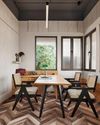
A BREATH OF FRAGRANT DESIGN IN DELHI'S HEART
An office that smells like perfumery; that is the vision that TWI brought to life in this office space designed for an acclaimed perfume company in India
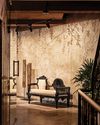
MASTER OF ALL TRADES
The ethos of forward-thinking and ingenuity finds its architectural counterpart within the walls of Nikhil Kamath and Abhijeet Pai's office-a vision of organic design infused with the essence of India
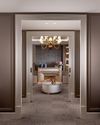
A TOUCH OF OPULENCE
Designed by Aparna Kaushik, this Delhi office displays an interesting balance of classic aesthetics and contemporary sensibilities
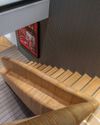
THE WOODEN WONDERLAND
Priyanka and Piyush Mehra envision a stunning experience centre for Vikas Plywood

THE HUB: BUILDING COMMUNITIES
Studio Lotus designs a dynamic mixed-use community hub that activates Chennai's largest IT Park

THE WINNER'S PERCH
Baldiwala Edge designs a Singapore-based ship broker's office as a torch collector's paradise, offering a 360-degree bird's-eye view of the Mumbai skyline
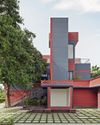
THE DIRECTOR'S CABIN
Designed by Envisage, this office gives a new definition to the traditional notion of biophilia

Designing Corporate India
From weaving the magic of a Star Trek-themed command centre to crafting bespoke block-printed workstations, Vijaya Bhargav and Arnab Ghosh-the trailblazing co-founders of Ostraca-have astonishingly transformed a staggering 29 million square feet of office space for India's tech giants and global enterprises-all while maintaining a flat hierarchical company culture-fuelling a master class in corporate design